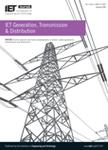版权所有:内蒙古大学图书馆 技术提供:维普资讯• 智图
内蒙古自治区呼和浩特市赛罕区大学西街235号 邮编: 010021

作者机构:Natl Inst Technol Warangal Dept Elect Engn Warangal Andhra Pradesh India
出 版 物:《IET GENERATION TRANSMISSION & DISTRIBUTION》 (IET Gener. Transm. Distrib.)
年 卷 期:2020年第14卷第20期
页 面:4416-4425页
核心收录:
主 题:Monte Carlo methods genetic algorithms Pareto optimisation particle swarm optimisation power system state estimation average relative percentage error constrained combinatorial multiobjective optimisation modelled meter placement combined dominance optimal solution Pareto front evenly distributed qualitative solutions hybrid multiobjective evolutionary optimisation algorithm distribution system state estimation local dominance based meter placement multiobjective hybrid decomposition Indian 85-bus distribution system PG& E 69-bus distribution system distribution algorithm-interior point method multiobjective hybrid estimation multiobjective hybrid particle swarm optimisation-krill herd algorithm nondominated sorting genetic algorithm-II binomial distribution-based Monte Carlo method combinatorial optimisation meter placement problem ARPE
摘 要:The study proposes a new hybrid multi-objective evolutionary optimisation algorithm based on decomposition and local dominance for meter placement in distribution system state estimation. The evenly distributed qualitative and diverse solutions on the Pareto front are required for a decision-maker for selecting a final optimal solution. Such a Pareto front can be achieved by obtaining the balance between convergence and diversity of multi-objective optimisation algorithm. Therefore, the proposed method combined dominance and decomposition techniques, modelled meter placement as a constrained combinatorial multi-objective optimisation. The meter placement is designed as a trade-off between three objectives that are minimising the cost of the meters, average relative percentage error (ARPE) of voltage magnitude and ARPE of voltage angle. As the meter placement problem is a combinatorial optimisation, the binomial distribution-based Monte Carlo method is utilised to initialise the population, which aims to improve the diversity, as a consequence it improves the convergence, which is a by-product of this method. The results of the proposed method are compared with multi-objective evolutionary algorithm based on decomposition, non-dominated sorting genetic algorithm-II and with multi-objective hybrid particle swarm optimisation-krill herd algorithm, multi-objective hybrid estimation of distribution algorithm-interior point method and demonstrated on PG&E 69-bus distribution system and Practical Indian 85-bus distribution system.